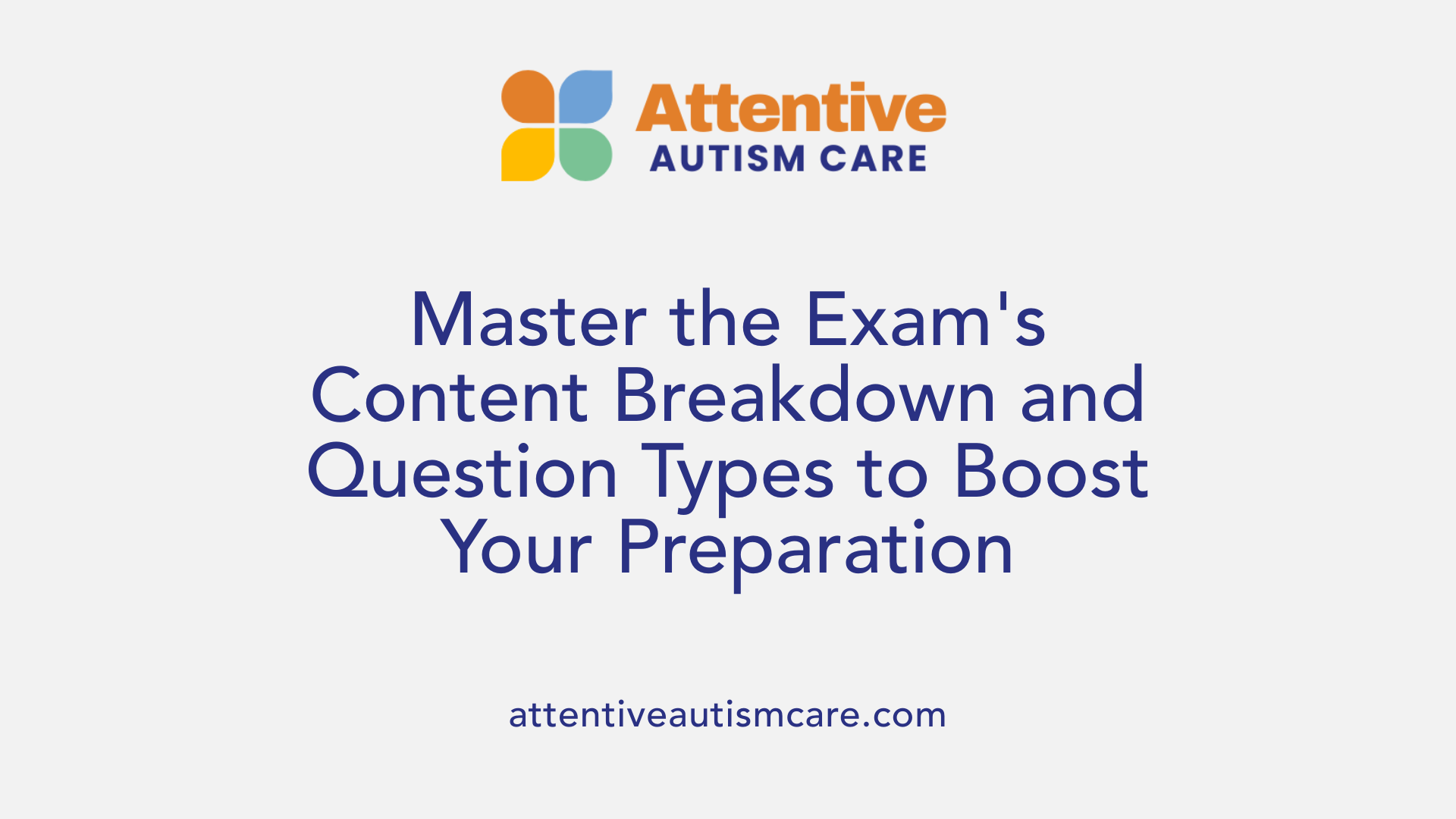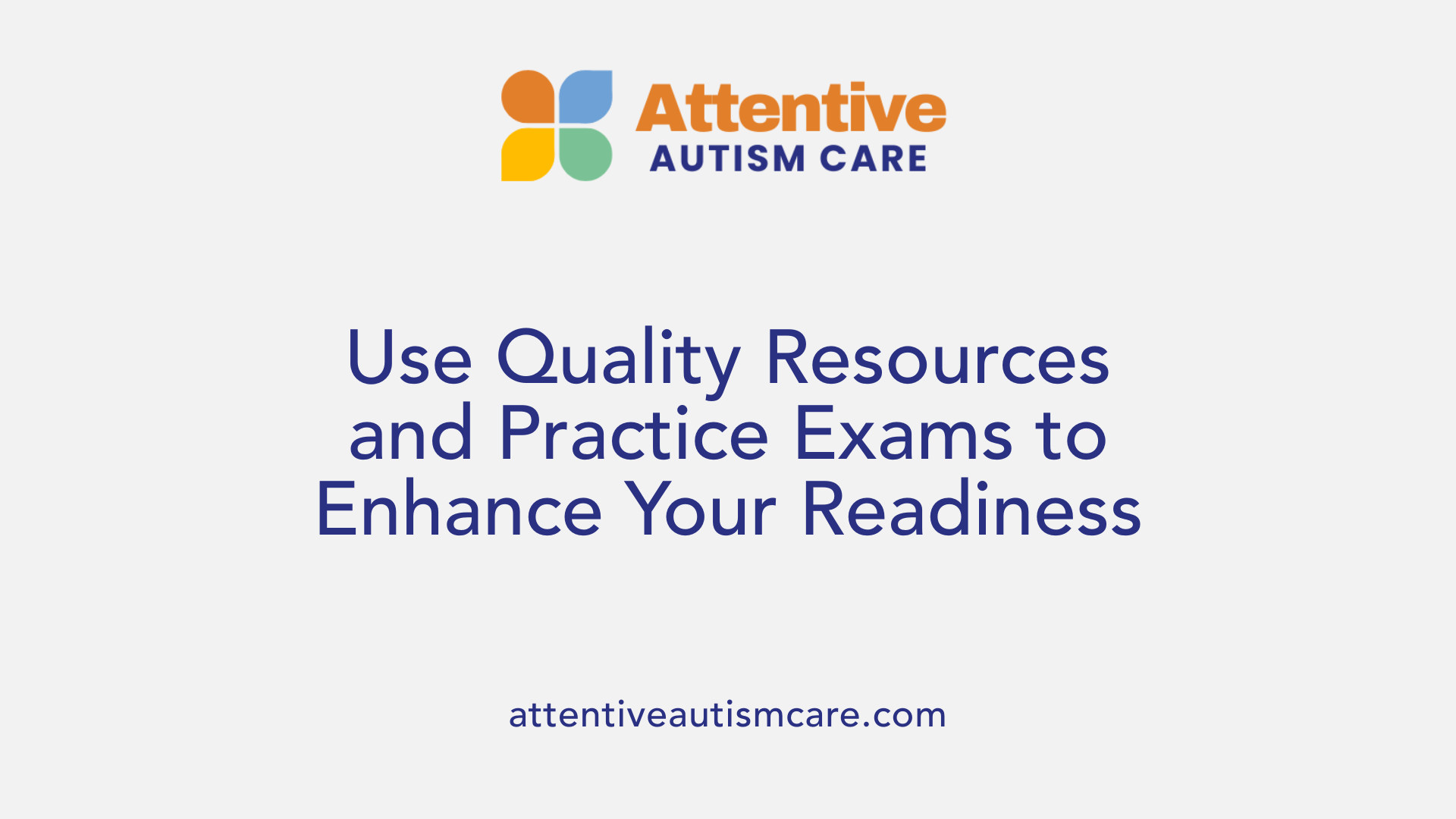How to Pass the BCBA Exam
Mastering the Path to Certification: Your Guide to Successfully Passing the BCBA Exam

A Complete Roadmap for Aspiring Behavior Analysts
Earning the BCBA credential is a significant achievement that requires strategic preparation, understanding exam logistics, and mastering content areas. This comprehensive guide offers insights into the exam’s structure, effective study strategies, resource access, and practical tips to confidently navigate the certification process and excel on exam day.
Understanding the BCBA Exam: Format, Structure, and Scoring

What is the structure, format, and scoring criteria of the BCBA exam?
The BCBA exam is a rigorous assessment designed to evaluate the knowledge and skills of behavior analysts. It is a computer-based test that features 185 multiple-choice questions. Out of these, 160 are scored questions, while 25 are unscored pilot questions used to evaluate new items for future exams.
The exam is administered over a four-hour period at Pearson VUE testing centers, providing a controlled environment for all candidates. Its content is divided into nine domains that align with the BCBA Task List, covering critical areas such as behavior analysis fundamentals, assessment, intervention strategies, ethical considerations, and supervision practices.
Question types vary to assess different competencies, including traditional multiple-choice questions, scenario-based questions that require applying knowledge to real-world situations, visual analysis questions, and occasionally, essay-style questions. This diversity ensures that candidates are tested on their theoretical understanding as well as practical application.
Scoring for the BCBA exam is based on a scaled score with a passing criterion of approximately 76%. This typically translates to correctly answering about 114 of the 150 scored questions. The final score is determined through a standard-setting process known as the modified Angoff method, which ensures consistency across different exam forms.
Preparing effectively involves thoroughly reviewing the BACB Task List, practicing a variety of question formats, and honing time management skills to complete the exam within the allocated hours. Understanding the exam's structure and scoring system is essential for devising a focused and efficient study plan.
Developing a Structured and Effective Study Plan

How do I create a timetable for my BCBA exam preparation?
Start by setting a realistic timeline that spans from one to six months, depending on your prior knowledge and available study time. Break down the content areas according to the BACB’s Task List, allocating more time to sections with a higher number of questions. Incorporate regular intervals to review previous material, take mock exams, and assess progress.
How should I prioritize content areas based on question weight?
Review the BCBA task list thoroughly to identify which sections contain more questions, indicating their importance on the exam. Focus first on these areas, such as assessment and data analysis, then move on to other content areas like ethics and behavior intervention. This approach helps optimize your study efforts for maximum exam coverage.
What study resources are most effective?
Utilize a variety of resources, including official study guides, the Cooper book, and online platforms like StudyABA.com. Flashcards, especially ones focused on key terms and ethics codes, reinforce retention. Mastery Modules and other online courses can provide targeted learning on difficult topics.
How important are practice exams and self-assessments?
Practicing with full-length mock exams under timed conditions, ideally matching the 4-hour duration, builds exam stamina and familiarity with the question format. Regular self-assessment through these tests helps identify weak areas, enabling you to adjust your study plan accordingly. Tracking progress with graphing scores and study hours visualizes your improvement over time.
Final tips for a successful study plan
Maintain consistency by studying daily, using methods like SAFMEDS for active recall. Mix studying with real-world applications of behavioral concepts through fieldwork or case studies. Prioritize self-care, manage anxiety, and stay motivated with peer support or study groups. By following a structured plan and regularly assessing your progress, you'll enhance your readiness for the BCBA exam.
Mastering Exam Content Areas and Leveraging Resources

What topics and content areas should I focus on during BCBA exam preparation?
Preparing for the BCBA exam requires a thorough understanding of its comprehensive content outline. Candidates should prioritize all nine domains outlined in the BCBA Test Content Outline. These include the philosophical foundations of behavior analysis, core concepts and principles, measurement, data display and interpretation, experimental design, ethical considerations, behavior assessments, intervention procedures, and personnel supervision and management.
Understanding the specific knowledge and skills within each area is essential. This involves mastering assessment methods, developing and implementing intervention strategies, analyzing data effectively, and applying ethical standards rigorously. Reviewing the BACB’s 6th Edition Task List categories—focusing on foundational knowledge, practical applications, behavior-change strategies, system management, and supervision—helps ensure no critical area is overlooked.
Employing targeted study methods enhances preparation. Practice questions, guided group discussions, and spaced repetition techniques reinforce learning and improve recall. Gaining practical, hands-on experience in assessments, intervention planning, and ethical practice not only deepens understanding but also boosts confidence for the exam.
To maximize your study effectiveness, use high-quality resources such as official study guides and practice exams. Familiarize yourself with the BACB Ethics Code, especially Section E, as ethical questions form an integral part of the exam content. Accessing mock exams that mimic the difficulty and format of the real test can help identify weak areas.
Additionally, engaging in review courses and joining study groups can provide additional support and accountability. Regularly reviewing high-yield areas such as behavior assessment methods and intervention procedures ensures you are well-prepared to handle the breadth of content on exam day.
Overall, a balanced approach combining theoretical knowledge, practical application, and consistent review using reliable resources will guide you toward a successful BCBA exam performance.
Mock Exams and Practice Questions: Your Key to Success
Taking full-length practice exams is a crucial component of effective BCBA exam preparation. These exams simulate the actual testing experience, helping candidates assess their knowledge, identify weak areas, and build confidence. It’s recommended to complete mock exams under conditions that mirror the real test, including time limits and question formats, to develop exam endurance and familiarity.
Practicing in an environment that closely resembles the test day provides valuable insights into your performance. Analyzing results after each mock exam allows you to pinpoint specific content areas or skills that need improvement. This targeted approach ensures that your study efforts are focused efficiently, reducing wasted time and boosting your chances of success.
Refining your skills with focused practice is essential. Use resources such as SAFMEDS, flashcards, and mastery modules to improve recall and fluency. Regularly reviewing your mock exam scores and tracking progress can reveal patterns and trends in your learning. Adjust your study plan accordingly, prioritizing weaker sections and reinforcing your strengths.
Engaging in consistent, focused mock exams and practice questions ultimately enhances your readiness. It boosts your confidence, sharpens your test-taking strategies, and ensures you're well-prepared for the complexities of the BCBA certification exam.
Managing Exam Day with Confidence
What are some tips for managing exam day and reducing anxiety?
Successfully managing your exam day involves careful planning and calmness. Begin by thoroughly preparing in advance—developing a study schedule, practicing mock exams, and familiarizing yourself with the test format can boost your confidence.
On the day of the exam, prioritize getting a good night's sleep and eating a nutritious meal beforehand. Arrive early at the testing site with all required identification and materials, such as laminated notes or any allowed personal tools. Being punctual helps reduce stress and ensures you have time to settle in.
During the exam, employ strategies to stay calm, like deep breathing or positive self-talk. Taking short breaks if overwhelmed, and flagging difficult questions for review later, can help maintain focus. Remember, the exam measures your minimum competency level, not your final worth, which can alleviate pressure.
Creating a support system, whether through friends, family, or peer groups, can provide encouragement. Behavioral techniques such as mindfulness and stress management skills, supported by behavioral science, are effective in reducing test anxiety.
Overall, arriving prepared, staying positive, and managing your time wisely can help you approach your exam with confidence and resilience.
Registration, Application Process, and Test Scheduling
What steps are involved in the BCBA exam registration and application process?
The journey to taking the BCBA exam starts with ensuring you meet the eligibility criteria established by the BACB. These typically include specific educational qualifications, supervised experience, and coursework requirements. Once eligibility is confirmed, candidates must complete and submit an application online through the BACB's official website.
After the application is reviewed and approved, candidates will receive an Authorization to Test (ATT) email. This important document grants permission to schedule the exam. Candidates then create or access their Pearson VUE account to select an exam date and location. The exam can be taken in person at a Pearson VUE testing center or through Pearson VUE’s online remote proctoring service, depending on the options available.
Candidates are responsible for managing their test date, with the ability to reschedule or cancel at least 48 hours prior to the exam. Rescheduling or cancellation requires notification through Pearson VUE’s platform, and fees may apply. On the day of the exam, candidates should arrive early, bringing valid identification and following security requirements.
Immediately after completing the test, candidates receive preliminary results. Official passing or failing status is confirmed via email and appears in their BACB account within approximately one week. Proper preparation, including reviewing the BCBA Handbook and familiarizing oneself with exam procedures, is essential for a smooth process and successful certification pursuit.
Exam Difficulty and Success Factors
Why do many candidates find the BCBA exam difficult, and how can I improve my chances?
Many candidates view the BCBA exam as quite challenging due to its broad and detailed content, which includes a wide range of topics from the BACB’s 6th Edition Test Content Outline. The exam tests not just knowledge but also the ability to apply behavioral principles in real-world situations, which can be complex and nuanced.
Additionally, the exam’s high-stakes nature and strict passing score of 76% can increase pressure, leading to test anxiety for some candidates. The exam consists of 185 multiple-choice questions, including 10 pilot questions, and is known for its rigorous format.
To boost your chances of success, start by thoroughly reviewing the BACB’s Task List and Ethics Code, especially focusing on sections like behavioral assessment, behavior change procedures, and ethics. Take initial mock exams to identify weak areas, and then tailor your study plan to address those topics.
Develop a structured study schedule spanning from one to six months before the test, incorporating active learning strategies such as SAFMEDS for daily practice. Engage in practical fieldwork under the supervision of a BCBA to reinforce your understanding of real-world application.
On exam day, preparation is crucial. Arrive early, stay calm, and manage your time effectively during the test. Be sure to answer every question, flag difficult ones for review, and utilize laminated notes if allowed. Proper mental and physical readiness, along with thorough preparation using high-quality mock exams from sources like StudyABA.com, can greatly improve your chances of passing and overcoming the exam’s difficulty.
Putting It All Together: Final Tips and Reminders
Last-minute review strategies
As the exam day approaches, focus on efficient review rather than cramming. Revisit your study schedule to reinforce weak areas identified through mock exams and practice questions. Utilize tools like flashcards or SAFMEDS to quickly reinforce key terms, ethical codes, and task list priorities. Reviewing summaries and key concepts from the BACB’s 6th Edition Test Content Outline can solidify your understanding of the exam domains.
Avoiding common pitfalls
Be aware of common mistakes, such as neglecting the importance of managing your time during the exam or failing to arrive early. Avoid last-minute cramming, which can increase anxiety and reduce confidence. Also, do not overlook the importance of understanding the exam format and policies, like rescheduling or canceling procedures; knowing these policies in advance can prevent unnecessary stress.
Ensuring proper rest and nutrition
On the night before the exam, get a good night’s sleep to ensure your mind is rested and alert. Eat a nutritious breakfast on test day—prefer options rich in protein and low in sugar—to sustain your energy levels. Hydrate well but avoid excessive caffeine, which can exacerbate anxiety or cause jitters. Proper nutrition and hydration are vital for maintaining focus and cognitive function during the exam.
Arriving early at the testing center
Plan to arrive at the Pearson VUE testing site at least 30 minutes before your scheduled exam. Bringing proper identification, such as a government-issued ID, is mandatory for check-in. When you arrive, follow all security protocols and instructions carefully. Being early allows you to settle in calmly, review any last-minute notes discreetly, and avoid rushing or feeling panicked just before starting.
Managing exam day and reducing anxiety
Managing exam day and reducing anxiety involves thorough preparation, such as creating a detailed study plan, practicing with sample questions, and familiarizing yourself with the exam format to build confidence. On the day of the exam, ensure you get adequate rest, arrive early with all necessary materials, and engage in self-care activities like proper nutrition and breathing exercises to calm nerves. Employ relaxation techniques such as mindfulness and positive self-talk to reframe the exam as a measure of minimum competencies rather than a high-stakes judgment. Using time management strategies, like pacing yourself and taking regular breaks, can prevent last-minute stress and improve focus. Additionally, maintaining a supportive environment, seeking community encouragement, and handling anxiety proactively through techniques endorsed by behavioral science can significantly enhance performance and reduce exam-related stress.
Preparing for Success: Your Final Steps and Encouragement
Achieving BCBA certification is a rigorous yet rewarding journey that hinges on comprehensive preparation, understanding the exam’s structure, and strategic practice. By familiarizing yourself with the exam content, practicing under real-test conditions, leveraging valuable resources, and managing stress effectively, you can maximize your success. Remember to develop a tailored study plan, take full advantage of practice exams, and ensure you arrive at the test site confident and well-prepared. Stay focused, maintain a positive mindset, and celebrate the progress you make along the way. With dedication and strategic effort, passing the BCBA exam is within your reach.
References
- EXAMINATION INFORMATION - Behavior Analyst Certification Board
- 10 Study Strategies! BCBA Exam Prep: Handbook & Task List for ...
- BCBA Exam Advice, Strategies, and Tips - StudyABA.com
- How Hard is it to Pass the BCBA® Exam?
- EXAMINATION INFORMATION - Behavior Analyst Certification Board
- BCBA Exam - Crush Your Test
- EXAMINATION INFORMATION - Behavior Analyst Certification Board
- What Score Do You Need to Pass the BCBA Exam? - AATBS




































































































